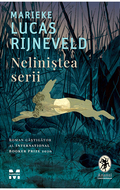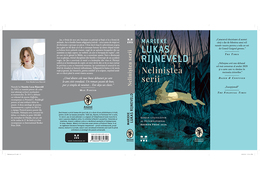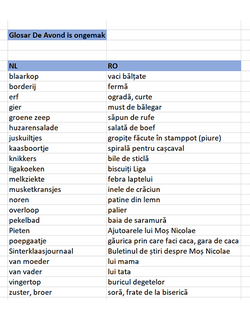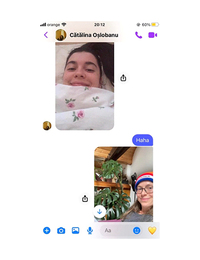Translating Marieke Lucas Rijneveld
Between work and intimacy. About translating as a duo and doing it fast

In November 2020 Alexa Stoicescu and me, Cătălina Oșlobanu, signed the contract with Pandora M publishing house to translate Marieke Lucas Rijnevelds De avond is ongemak, the winner of the 2020 International Booker Prize. The book had to be ready in five months and we would be translating it as a duo. These two factors have been decisive for our translating process and the resulting translation. In this following virtual conversation, we reflect on the entire process, and explore how the time constraints and collaboration influenced the translation and how it shaped different levels of intimacy that developed between the two of us as translators and the book itself.
Working process
When did you know you wanted to translate the book?

This is what the Romanian version of De avond is ongemak looks like (front and back cover, as published in November 2021 by Pandora M)
Cătălina: It didn’t take long to decide that I wanted to translate this book. As soon as I read it, I wanted all of my friends to be able to read it in Romanian. So, I had already unofficially been working on it since 2018, while I was reading it for the first time. With pen in hand, I would make annotations and translate little words or expressions as I went. But I planted the thought of suggesting it to publishing houses somewhere in the future though, for when I would be more confident as a translator and the book market wouldn’t seem as scary. Then, the Booker Prize award speeded things up considerably. Worried that someone else might be assigned to translate it with this new recognition, while also aware that I had two chapters ready, the next morning I started emailing the main publishing houses in Romania. As I would soon find out, this can be quite disheartening since the chances of getting a reply without direct contacts in the industry close to zero. That’s one of the reasons why being in touch with Alexa throughout the entire process was so crucial, as she kept encouraging me not to give up.
Alexa: I had read the debut poetry volume of Marieke Lucas and loved the explosion of images and the queer and eerie vibe of the tone. When De avond is ongemak was published, I immediately read it and discussed it with students. My colleague Delia even took on the big task to translate some pages during her translation classes with the students. Although I was impressed by the book, to be honest, I didn’t think that publishing houses in Romania would be interested in this book that is ‘too dark, too Dutch’, from a non-binary, unknown young Dutch author. Moreover, there’s a one in a million chance to convince an editor to publish a book of your choice. But then the novel received the Booker Prize. I contacted Humanitas, one of the biggest publishing houses in the country, participated in the auction for the rights to the book but decided it was too expensive. When Cătălina read online that Pandora M, the new branch of Editura Trei, with whom I had worked with in the past had bought the rights, I encouraged her to write them an e-mail and luckily, they hadn’t contacted another translator yet.
How did you decide to work together?
Cătălina: Deciding we should work together came almost naturally. I knew I didn’t want to translate it on my own (the thought that the entire novel would depend on my interpretation only felt unfair) and I knew Alexa loved the book and would probably enjoy joining forces. As for who did what, for a better continuity of the narrative, we initially agreed that I would do the translation part and Alexa the revising and correction part. But since the deadline was so tight, I barely had enough time to finish the first two parts in time, so in the end Alexa had to translate the third part and we both revised each other’s work.
Alexa: This was not the first time that Cătălina and I worked together and I already knew we made a good team, so when she proposed to work together, I immediately got on board. Time was tight, so doing it alone would have been a huge struggle. Translating fast would mean a higher risk of maybe misinterpreting or loosing bits and pieces of this extremely dense novel. I knew that working together would assure a good end result.
What was your own work process like? And how was it for you to work with the text on the whole?

We used a glossary to keep track of the most frequent words, which looks like this
Cătălina: Working on the book turned into a full-time project for me. I would work on the text’s very fine nuances with my most clear morning mind (anything from word plays to finding the best alternative to non-translatable words), take a nap after lunch and start with new pages in the second part of the day. By which time I had already bombarded my family Whatsapp with questions that Google Translate and dictionaries had no answers for. Like, “what’s the word for the tool used to break ice?” “does anyone know of a game that uses small bones?” (which actually did the rounds with the entire extended family, aunts and cousins included, but we got there in the end: it’s “piolet” and “arșice”). I found this to be one of the most fascinating ways of getting closer to Romanian, exploring the limits within the language, learning when to accept a compromise alternative.
Alexa: I was lucky, because I started working on Marieke Lucas’ text reading Cătălina’s translation of the first chapters. Lucky, because somebody else had to first deal with the avalanche of words that this novel contains. De avond is ongemak is a very concentrated text, where quite a lot happens in one sentence. It’s like driving a big truck you actually don’t have a driving license for. Finding the Romanian voice for the characters was the biggest challenge for me: how do they speak and most importantly how does Jas think? I felt that Cătălina understood Jas very soon in the translation, she chose words from a familiar, homey, yet distant environment. Still, it’s not easy working on somebody else’s translation, you feel like you’re intruding in somebody else’s mind, but I found out quite fast that I did at times have another opinion and started liking interfering. I also have a full-time job, so working on this book took a heavy toll on me. I worked late at night or very early in the morning and during the weekend and on vacation. Marieke Lucas has accompanied me in the weirdest times.
What about working together? Looking back at it, how would you say it influenced or shaped the outcome of the translation?
Cătălina: Since we both had to revise each other’s work, in a way, the translating probably did go slower at times. But in the end, I think it was actually a major win situation. There’s less chance that things will get lost in translation or be overlooked so you’re much less likely to be unsure of yourself. And, very important, the pressure of not doing justice to the text considerably diminishes since it doesn’t all rest on one pair of shoulders. I found revising Alexa’s translated bits to be much more difficult than translating myself. Maybe because revising involves getting out of one’s own flow, entering someone else’s mind space to a certain extent, meaning that you can’t go by your gut feeling anymore. Anything you disagree on has to undergo a thorough process of rethinking and has to be justified to the other. „Would Jas say this? Would her dad swear like this or is it too harsh?” Although it was the most difficult part, I also found it to be my favourite. The quick back and forth, often through emoji’s in the comments when one of us came up with a good idea or a silly one, the encouraging “mooi” (nice!) or just “superb” / “ador”. It was a very intimate way of getting to know each other, as if I suddenly had access to a thinking process of Alexa’s which couldn’t be accessed in any other way.
Alexa: De avond is ongemak is fragmented on my computer in more than 40 files, that’s how many times we sent the chapters back and forth to each other. The translation definitely took longer, but the end version was also better as a result of that. Cătălina and me have a different feeling of the Romanian language and talking about the ways in which we read a word or a sentence, made it all worthwhile and made us communicate clearer. Moreover, I felt that I could relax while translating, because there is a second opinion coming. That does not mean to become sloppy, but working with somebody else lifts a weight of your shoulders, because you share the responsibility. I think we came up with better solutions: for the multitude of realia, the weird mixture of childish language and the harsh parts and mostly also the natural flow of the book. Reading it back and forth so many times made the book sound every time more natural in Romanian.
How was it to collaborate with an editor?
Cătălina: Before sending the book off, we worked very closely with a third reader, the Romanian to Dutch translator Jan Willem Bos. The text was so dense that even after reading it countless times, there were still things we wouldn’t have picked up on without his keen eye. For instance, the reference to a big bad wolf (you can tell Dutch isn’t the language either me or Alexa had read Little Red Riding Hood). We had made sure that every single word in the book was in the exact right place, what Jas said was definitely what Jas would say, the whole thing was checked and double-checked not only by the two of us, but also by Jan Willem. So for me, the new suggestions from the publisher felt almost intrusive at times and I noticed they were often met with a bit of resistance. It was especially hard to let go of the changes in the topic. „That’s not Jas’ tone!”. But this is only because you get so attached to the text that it becomes difficult to accept a different interpretation, not necessarily because the suggestions were bad. You create this character, it’s almost like being a puppeteer, you bring the character to life, draw its eyes, its mouth, find the perfect voice for it, you know exactly which link words it uses, when, in which part of the sentence, and most importantly, you know exactly what they would never say. I came to know Jas so well that when I started reading Mijn lieve gunsteling, Rijneveld’s second novel, I was still reading it with Jas’s voice resonating in my head. The relationship is so intimate.
Alexa: Jan Willem Bos was the mentor of my first translation of K. Schippers and also Cătălina’s mentor when she was part of the first edition of CELA, so working with Jan Willem feels very familiar. He is very meticulous and we knew that our text would be in good hands. Luckily, he agreed to check our text. His encouraging comments meant a lot. I was also very glad that Maria Ghiurțu and Alin Croitoru from Pandora M read our translation with such care and interest, as this does not always happen. Alin made us go through the book three times again and again and explain our choices. We were especially keen on keeping the childish tone of Jas, even though it sometimes interferes with a more distant literary language, that the Romanian reader is used to. We succeeded in maintaining what felt to be the right voice of the Romanian Jas and made compromises in other places.
The translated text
What’s something that time was too short for, or, on the contrary, something you feel because we didn’t have much time at our disposal, even turned out to be a plus for the end result?
Cătălina & Alexa: We decided not to consult any of the translations in other languages while we were still working on the text as we felt it would be too distracting, and that it could potentially influence our own translation. But the first thing that comes to mind is that, at the end of the whole process, I would have liked to have been able to check the translations in other languages, maybe to have had enough time to write and wait for a possible response from the writer, ask a few questions about things we weren’t as sure of. Although translating without being in touch with the writer is a good exercise too, it gives more freedom to be daring in the interpretation and decision making.
What do you feel was lost in translation?
Cătălina: We decided not to add any footnotes in the book, as we thought it would distract from the reading flow and we didn’t think it would suit Jas’ stream of consciousness. So maybe one of the biggest losses in the translation is the fact that the Romanian reader will not know that Jas also stands for jacket, it’s not just a simple name. Another thing that comes to mind is the blue envelope. At a certain point, Jas complains about the fact that she never receives mail whereas her dad always gets beautiful blue envelopes. What we couldn’t keep in our text is the implied reference that the colour carries with it. The blue envelopes that she admires are in fact anything but beautiful, since the colour is actually an indicator of the belastingdienst (the tax office). But we weren’t able to keep the reference in Romanian. We wouldn’t have been able to explain it without drawing more attention to it than needed.
Alexa: I was strongly against footnotes because a text written in stream of consciousness cannot have footnotes. It would interrupt the flow too much. So I’m quite pleased about that, but indeed less pleased that we didn’t translate the name of the main character, especially because in Romanian, “J” would be read as a the “J” (from Jacques). Luckily, the name does not appear too often. The title is something that was transformed in translation. The “ongemak” is so typical for Germanic languages that we could not find a perfect equivalent. Other that the English “discomfort”, the Romanian “neliniște” means disquiet, uneasiness. The construction “De avond is ongemak” sounds very powerful in Dutch, while the Romanian version with a gerund is rather more poetical. Yet, losing some bits and pieces in translation is something that we had to get used to.
What did you most struggle with while translating?
Cătălina: The book is steeped in Dutch culture, the farm life and the heavily Protestant environment in which Jas grows up. This was all already a huge challenge to find the right equivalents in Romanian, but aside from that, the text is also very very dense, with a really specific rhythm to it, almost like a long poem. I think this was actually the biggest challenge, keeping the rhythm and the tone in line with the original text. The tenses weren’t any easier either.
Alexa: All the terms that the narrator uses for the farm life, the cows, the objects used for the cows, for all the cookies and the food were a challenge. Maybe more so were the words for pee and poop. The Romanian literary language is quite prude and does not necessarily invite this vocabulary. But we made it work. I struggled with it but, at the same time, enjoyed finding the right tone and register, somewhere between sweet and mild, yet at times aggressive.
What is one outcome that you’re proud of?

And this is what we looked like when Alexa pressed the send button for the FIN 297265 version of the book, the finally FIN one
Cătălina: I am very pleased with the ambiguity around “where Jas comes from”. I really think it’s a plus point the fact that both of us come from different regions of the country. This way, the Romanian Jas too, can’t easily be pinned to a particular geographic region. Just as the Dutch Jas. She’s a bit from the North East where I’m originally come from, (her fairy dust is therefore called “puchi”, not “urdori”, for example), a bit from the capital area too, where Alexa comes from (where they can swear like no other, just like Obbe does).
Alexa: I’m really happy to have finished the translation, happy with the result and happy to read the voice of Jas in Romanian, to see the book in such a beautiful hardcover edition and to realize that there is space and willingness in Romania to accommodate a writer like Marieke Lucas Rijneveld. I’m hoping that there will be new translations that we can work on as a duo.
(Cătălina Oșlobanu & Alexa Stoicescu)
